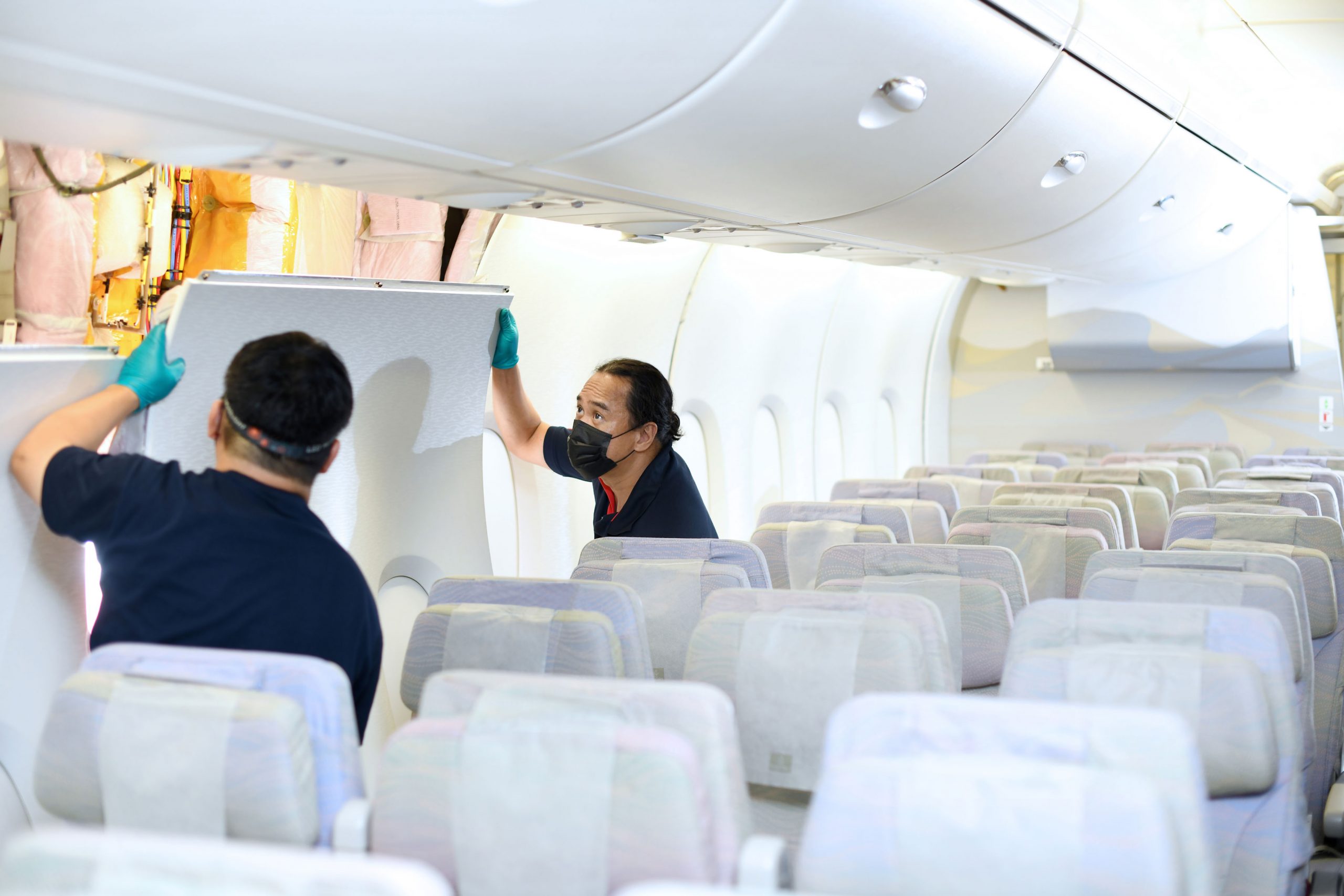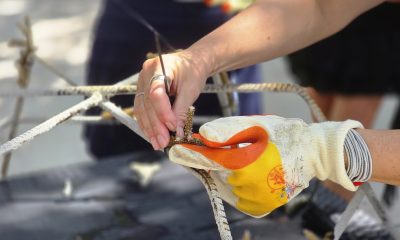International
Britain’s COVID-19 app: The game changer that wasn’t

LONDON (Reuters) – As Britain’s COVID-19 infections soared in the spring, the government reached for what it hoped could be a game changer – a smartphone app that could automate some of the work of human contact tracers.
The origin of the NHS COVID-19 App goes back to a meeting on March 7 when three Oxford scientists met experts at NHSX, the technical arm of the UK’s health service. The scientists presented an analysis that concluded manual contact tracing alone couldn’t control the epidemic.
“Given the infectiousness of SARS-CoV-2 and the high proportion of transmissions from presymptomatic individuals, controlling the epidemic by manual contact tracing is infeasible,” concluded the Oxford scientists’ paper, which was published in the journal Science two months later.
The Oxford researchers believed that a smartphone app could help locate individuals who didn’t know they were infected – and by alerting them quickly could reduce and even halt the epidemic if enough people used it. Within days of the meeting, NHSX began the process of awarding millions of dollars worth of no-bid contracts to develop such an app, government procurement records show.
In the weeks that followed, ministers seized on the technology as a route out of Britain’s lockdown that began on March 23. At a Downing Street coronavirus briefing on April 12, health secretary Matt Hancock announced that testing had begun on what he called the government’s “next step – a new NHS app for contact tracing.”
He explained that people could use the app to report feeling unwell and it would anonymously alert other app users who recently had been in close contact with them. On April 28, he said he expected the app to be ready by mid-May.
Privately, some researchers who had proposed the app were dismayed that the government had stopped widespread testing on March 12, a decision they believed undermined the app’s effectiveness and public health in general. “We were very clear from the start that this thing needed to work with testing,” David Bonsall, a clinical scientist at Oxford who attended the March 7 meeting, told Reuters.
By early May, transport secretary Grant Shapps was heralding a test of the app on England’s Isle of Wight. “Later in the month, that app will be rolled out and deployed, assuming the tests are successful, of course, to the population at large,” he said. “This is a fantastic way to ensure that we are able to really keep a lid on this going forward.”
Pat Gelsinger, chief executive of VMware Inc, a Silicon Valley tech firm hired to develop the app, told a Fox Business television interviewer on May 8, “I tell you, we think this is the best one in the world and we’re really thrilled to be working with the NHS in the UK to help bring it about.”
But by the end of May, government officials were downplaying the app. In an interview with Sky News, Hancock called the app “helpful” but said traditional contact tracing needed to be rolled out first. Quoting another official, he said, “It puts the cherry on the cake but isn’t the cake.”
Behind the scenes, NHSX testers were discovering serious technical problems.
The agency had opted to develop an app that collected and stored data on central servers that could be used by health authorities and epidemiologists to study the disease. It relied on a technology called Bluetooth to determine who recently had been near someone displaying symptoms and for how long.
NHSX testers were finding that while the app could detect three-quarters of nearby smartphones using Google’s Android operating system, it sometimes could only identify four percent of Apple iPhones, according to government officials. The problem was that, on Apple devices, the app often couldn’t utilize Bluetooth because of a design choice by Apple to preserve user privacy and prolong battery life.
The issue was no secret. Apple and Google had jointly announced in April that they would release a toolkit to better enable Bluetooth on contact-tracing apps. But to protect user privacy, it would only work on apps that stored data on phones, not central servers. The NHSX app didn’t work that way.
The government insisted it had developed a successful work-around to overcome the Apple issue. But not everyone was convinced. The advocacy group Privacy International, which had tested the app in early May, “found it wasn’t working properly on iPhones,” Gus Hosein, the group’s executive director, told Reuters. But because of the government’s assurances, he said, “We just assumed we were doing something wrong.”
Other countries, including Germany, decided they would change their apps to work with the Apple-Google toolkit. That raised another problem with the UK app — it likely wouldn’t be compatible with many other contact-tracing apps so British travellers wouldn’t be notified if they were exposed to the virus.
On June 18, weeks after the UK app was supposed to be rolled out, government officials announced a dramatic U-turn — they would abandon the app being tested on the Isle of Wight and try to create one that worked with the Apple-Google technology. Work had already begun on it and they had learned lessons from the test, they said.
NHSX referred questions about the app to the health department, which said, “Developing effective contact-tracing technology is a challenge facing countries around the world and there is currently no solution that is accurate enough on estimating distance, identifying other users and calculating duration which are all required for contact tracing.”
A spokesman for VMware said it “is proud of the work we have done and continue to do to rapidly develop an application to support the UK’s contact tracing and testing efforts.”
A government official expressed confidence the app would be ready by the autumn or winter — although initially, the official said, it might not contain contact tracing at all, but offer other services that are yet to be determined.
Reporting and photo: Reuters
International
Nika Zorjan’s ‘V Postelji’ music video showcases timeless beauty of Maldives

Released just three weeks ago, Nika Zorjan’s latest music video, ‘V Postelji’ (meaning “In Bed”), has captivated audiences with its stunning cinematography set against the breathtaking backdrop of the Maldives. Directed by videographer Niko Karo, who accompanied Nika to film the video, the project was organised by Moji Maldivi, an agency based in Slovenia dedicated to promoting the Maldives as a premier holiday destination in Balkan region.
The video beautifully captures Nika strolling through serene pathways shaded by iconic coconut palm trees at Villa Park, later walking along the sun-kissed beaches of Villa Nautica, and finally enjoying the golden sunset on a bed at the beach of Furaveri Maldives. Each scene showcases the natural beauty and tranquil ambiance of the Maldives, enhancing the emotional depth and visual splendour of the music video.
Nika Zorjan, renowned as a Slovenian pop star and Eurovision contestant, has also gained fame for her cover songs, including her most popular rendition of Sia’s Cheap Thrills, which has amassed nearly 50 million views on YouTube, with over 60 million total views on the platform. “Shooting a video in the Maldives is heavenly,” she added. Filmed in one of the world’s most captivating tourist destinations, the Maldives serves as more than just a scenic backdrop; it becomes an integral part of the video’s narrative.
V Postelji not only showcases Nika Zorjan’s musical prowess but also pays homage to the Maldives’ timeless allure and cultural richness. The video has resonated deeply with audiences, garnering praise for its artistic vision and the mesmerising beauty of the Maldivian landscape. The lush greenery, crystal-clear waters, and pristine beaches depicted in the video create a sense of paradise that complements the song’s evocative lyrics.
As viewers continue to immerse themselves in the captivating visuals and emotive melodies of V Postelji, it reinforces the Maldives’ reputation as a destination where natural beauty and tranquility converge effortlessly. Nika Zorjan’s collaboration with Niko Karo underscores their shared appreciation for the Maldives’ serene ambiance and its ability to inspire creativity and emotional expression. This partnership, facilitated by Moji Maldivi, highlights the agency’s dedication to showcasing the Maldives as an unparalleled holiday destination to the Balkan market.
Featured
Emirates undertakes largest known fleet retrofit project

Emirates has kick-started its plans to upgrade the entire interior cabins of 120 Airbus A380 and Boeing 777 aircraft – two of the largest commercial aircraft types in service today.
This ambitious project, representing a multi-billion dollar investment to ensure Emirates’ customers “fly better” for the coming years, officially commences in November and is managed entirely by Emirates’ Engineering team.
The target is to completely retrofit four Emirates aircraft from start to finish every month, continuously for over 2 years. Once the 67 earmarked A380s are refreshed and back in service, 53 777s will undergo their facelift. This will see nearly 4,000 brand new Premium Economy seats installed, 728 First Class suites refurbished and over 5,000 Business Class seats upgraded to a new style and design when the project is complete in April 2025.
In addition, carpets and stairs will be upgraded, and cabin interior panels refreshed with new tones and design motifs including the iconic ghaf trees which are native to the UAE.

No other airline has handled a retrofit of this magnitude in-house, and there’s no blueprint for such an undertaking. Therefore Emirates Engineering teams have been planning and testing extensively, to establish and streamline processes, and identify and address any possible snags.
Trials began on an A380 in July, where experienced engineers literally took each cabin apart piece-by-piece and logged every step. From removing seats and panelling to bolts and screws, every action was tested, timed and mapped out. Potential impediments to completing the installation of Emirates’ new Premium Economy Class or the retrofit of the remaining three cabins in just 16 days were flagged and documented for expert teams to review and address.
As part of the programme, new purpose-built workshops will be set up at Emirates Engineering to repaint, re-trim and re-upholster Business and Economy Class seats with new covers and cushioning. First Class suites will be carefully disassembled and sent to a specialised company to replace the leather, arm rests and other materials.
From the trials, Engineers discovered several unexpected solutions for instance: that existing food catering trucks could be easily repurposed to move parts destined for refurbishment from the aircraft to the workshop for their refresh, as these vehicles had doors of the right width and offer sufficient space.
Until the retrofit programme starts in earnest in November, a cross-disciplinary team has been assembled to regularly review the planning process, address any issues, and track updates on various aspects of the project such as procurement, staffing, and training.
Emirates’ new Premium Economy cabin class, which offers luxurious seats, more legroom, and a service to rival many airlines’ business offering, is currently available to Emirates customers travelling on popular A380 routes to London, Paris, Sydney. More customers will be able to experience the airline’s new Premium Economy cabins starting from year end, as the retrofit programme picks up momentum.
Featured
Eleanor helps over 30 Maldives hotels elevate guest services

Eleanor has been named as one of the top 10 concierge software providers globally.
Based on accurate, timely reviews from real users, the HotelTechAwards rank the world’s best hotel software firms and products and it also provides hoteliers direct access to a growing network of hotel technology professionals and decision-makers.
“The guest experience is the cornerstone of our platform. Our unified resort wide solution, Eleanor, has been built for resorts off the back of many years working in the industry and addresses the needs of both Sales and Marketing departments and perhaps just as importantly, the operational requirements of the team on the ground at the property. The days of resorts working with disjointed systems are now behind us,” says Darren Caple, co-founder and CEO.
“We are on a mission to make the guest’s resort experience as easy and as frictionless as possible. Whereas traditional providers in the market have come at this purely from a guest communication perspective, our background in resorts has allowed us to combine this basic requirement with the streamlining of operational processes. The result is truly a resort wide solution that removes the need for countless different systems to be deployed.
Eleanor allows resorts to deliver consistent, superior service levels to guests across all stages of their journey with contactless features helping to alleviate sensitive touch-points in the post pandemic period. More than 30 properties in the Maldives use our Eleanor platform to help butlers and guest services elevate the guest experience. These properties are seeing an increase in incremental revenue by over 30% and operational efficiencies of 600+ man hours per month. We are also beginning to roll out the platform in some Caribbean properties!”
Eleanor is making waves in the hospitality industry by pushing the conventional limits of what a resort guest app can achieve through its unique ability to facilitate direct bookings for services and activities. The traditional ‘request to book’ feature that is common amongst almost all other hotel apps is removed by a power booking and operational platform sitting at the heart of the solution that covers all the resorts’ departments. It’s this module which realises enormous operational benefits and insights for the resort.
“We, at Eleanor, are humbled and honoured that our clients have provided such positive reviews. Feedback from our clients, partners and hoteliers are incredibly valuable for us and we will continue to improve our offering and services”, said Caple.
To celebrate this success, Eleanor is currently offering resorts a free one month trial, together with free setup and training and discounted monthly fees.
Eleanor, founded in 2018 and has its headquarters in the United Kingdom. Created from over 15 years of hands-on expertise, Eleanor allows resorts to deliver consistent, superior service levels to its guests across all stages of their journey with contactless features helping to alleviate sensitive touch-points in the post pandemic period. Eleanor also helps to unlock operational efficiencies and boost incremental revenue and guest loyalty.
Hotel Tech Report’s Best Concierge Software 2022 Runner Up, reviewed as a preferred and reliable hotel software product by the global hotelier community.
For more information, visit www.eleanorapp.com.
-

 Cooking1 week ago
Cooking1 week agoPatina Maldives, Khyber unite for Holi festival dining experience
-

 Featured1 week ago
Featured1 week agoRomantic island experiences await couples at Sun Siyam Vilu Reef
-

 Featured1 week ago
Featured1 week agoCinnamon Hotels & Resorts Maldives launches March flash offer with savings of up to 80%
-

 Action1 week ago
Action1 week agoNoku Maldives strengthens reef protection through coral propagation
-

 Cooking1 week ago
Cooking1 week agoSebastian Frank to present ‘Roots & Waves’ menus at Nova Maldives in May 2026
-

 News1 week ago
News1 week ago‘Endless Summer’ brings wellness and family escapes to Westin Maldives Miriandhoo Resort
-

 Action1 week ago
Action1 week agoSiyam World hosts Fernando Torres and Mark Noble for festive football camps
-

 Featured1 week ago
Featured1 week agoThe Ritz-Carlton Maldives, Fari Islands unveils Masters of Crafts programme for 2026








